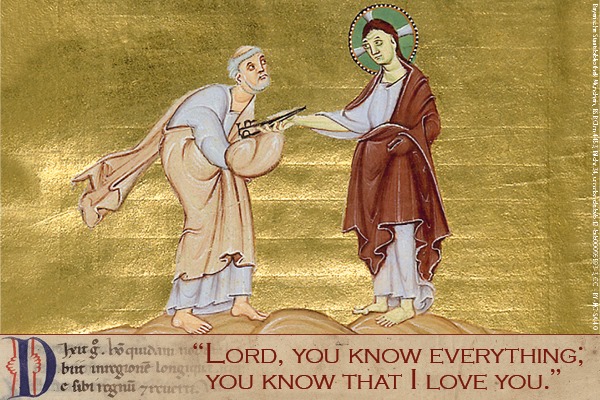Listening to the daily readings from John’s Gospel this week I was struck by the philosophical themes constantly appearing, mainly to do with the concepts of knowledge and truth. In his final prayer at the Last Supper, offered to the Father for his apostles as he leaves them for Calvary, Jesus speaks like a philosopher.
He wants his friends to be consecrated in truth as he himself is (Jn 17:19). He has kept them true to the Father’s name (17:11). His mission has been to offer eternal life to his followers and that involves knowing the Father and his Son, Jesus (17:3). This is not surprising you might say, coming from a man who claims to be the way, the truth, and the life (14:6), the one who proclaims that magnificent statement, “The truth will set you free” (8:32).

This emphasis should lead us to focus on the connection between faith, knowledge, and truth. To have faith is to know the truth revealed by God. In the scriptures, God’s Word, which is truth (17:17), is revealed to ignorant human beings through the power of the Spirit. The Holy Spirit was promised to remind the disciples of the teachings of Jesus and would teach them all things in time (14:26).
Now all of this teaching comes to a climax in the very last chapter of John’s Gospel with the story of the encounter between Jesus and Peter, where we come upon another idea linked with knowledge and truth. It is, of course, love!
Look at that conversation again from both sides (21:15-19). Jesus asks three times, “Do you love me?” as if he doesn’t know the answer! But the response is a bit surprising as Peter does not simply say back, “Yes, of course, I love you.” No, he replies to Jesus: “You know I love you.” In fact, on the third occasion, Peter makes the stronger point that the Lord who knows everything knows that Peter loves him.
In this exchange I think there must be an emphasis on the knowledge that Jesus has, and Peter’s reluctance to commit himself. Peter is saying that only Jesus knows whether the apostle loves him because Jesus knows him better than he knows himself.
The last time Peter claimed to love Jesus, at the last supper, promising to give up his life for the Lord, he went on to deny him three times (13:36-38)! And Jesus knew that this would happen and let Peter know there and then what the future would be (13:38). In fact, much of the Last Supper discourse of Jesus reveals his explicit knowledge of the future from the betrayal by Judas to the coming of the Spirit (14:29).
So Peter cannot afford to claim to love Jesus here. He can only turn the question back on Jesus, the one who really knows. And Jesus confirms what he knows of Peter’s future, that he will die for his Master and that this will prove Peter’s love. That love unto death is what is implied in the subsequent words, “Follow me” (21:19).
Therefore, only God knows how much or how little we love Him. Only God knows the full history of our lives and how we will turn out. We can only hope that we love God. We can never know.
But what comfort Peter must have derived from this encounter, not primarily from the commission to be a good shepherd of the flock of Jesus once he is gone, but to be informed by Jesus himself that he would remain faithful in love to the end. Peter can truly say, as we can: You alone know that I love you, I don’t.
But what I do know is that your love for me is unconditional.
Kieran Cronin OFM
